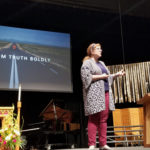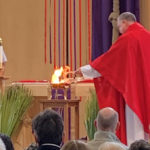Father Dan Dorau raises a question that all Catholics should ponder: “When we stand in line to receive Communion, are we really thinking about what we are doing?” He raised that question during an interview with The Catholic Messenger about a study series on Jesus and the Eucharist that the four parishes he serves in Lee and Van Buren counties are offering this Lenten season. The study series is one of many resources on the U.S. Conference of Catholic Bishops’ Eucharistic Revival website (eucharisticrevival.org). The USCCB launched the Eucharistic Revival in 2022 to “renew the Church by enkindling a living relationship with the Lord Jesus Christ in the Holy Eucharist.”
The prerequisite of “really thinking about what we are doing” as we wait in line to receive the Eucharist is full, active and conscious participation in the Liturgy from beginning to end. When we take the gift of the Eucharistic Christ into our own bodies, we say “yes” to our commitment to carrying out Jesus’ mission on earth by feeding the hungry, sheltering the homeless, welcoming the stranger, comforting the sick and befriending the lonely….
We live in a distracted society and none of us is immune to the myriad distractions that can permeate even our celebration of the Eucharist if we fail to reflect on what brings us together to celebrate. Reflection is a discipline that begins before and continues beyond the Mass with prayer, Scripture reading, study and action.
In his apostolic exhortation on the Eucharist, “Sacramentum Caritatis” (2007), the late Pope Benedict XVI calls us “to reflect on the connection between God’s action in the eucharistic mystery, our celebration of the liturgy, and the service of our neighbor through which God transforms the world. He underlines that salvation is God’s work, and shares with us his wonder at the ways God draws us, as willing co-workers in Christ, into the accomplishment of that salvation,” Jerome Hall, SJ, writes in “Pastoral Liturgy” (http://tinyurl.com/yz33j34j). “The Eucharist, as the Holy Father said, is a mystery to be believed, celebrated and lived.”
Pope Francis provided this visual example of living out the Eucharist that we celebrate: “If we were to invite someone to share our Sunday dinner, after sharing in the Eucharistic table, the Eucharist we celebrate would truly become a mark of communion,” the Holy Father said in his World Day of the Poor message last November. “If it is true that around the altar of the Lord we are conscious that we are all brothers and sisters, how much more visible would our fraternity be, if we shared our festive meal with those who are in need!”
Reflecting on the work of the Holy Spirit in the Eucharist, Associate Professor Ella Johnson of St. Ambrose University in Davenport focused on insightful passages in the Eucharistic Prayers of the Mass. Eucharistic Prayer IV, for example, “underscores the importance of the Holy Spirit’s work of leading us into the covenant renewal in Jesus Christ. … It highlights the way Christ’s sacrifice is renewed both through the Eucharist and by our living that same sacrifice in our daily lives” (The Catholic Messenger, 7-27-23). Do we listen attentively to the presider as he prays the Eucharistic Prayer? Do we respond with sincere commitment to that prayer?
The Eucharistic Revival website (eucharisticrevival.org) and the Diocese of Davenport’s Liturgy webpage (http://tinyurl.com/mrj7ypn8) provide excellent resources to help us to celebrate Eucharist with meaning and intentionality. Commit to full, active and conscious participation in the Eucharist by participating in Lenten programs and studies. Participate in a webinar of the McGrath Institute for Church Life of the University of Notre Dame on Feb. 13 from 3-4:15 p.m. titled The Eucharist and Catholic Social Teaching (http://tinyurl.com/yc6ek3t5). This webinar will explore “this intrinsic connection between the Eucharist and Catholic Social Teaching, especially as it concerns the poor,” the institute states.
We can also take action in so many different ways, among them: going to the USCCB website Action Center (votervoice.net/USCCB/Campaigns/110270/Respond) to send a message to Congress encouraging support for children and families by passing a strengthened Child Tax Credit (CTC) that prioritizes the poorest children. A strengthened CTC fosters the welcoming of new life and the building of family, the bishops say.
Our prayers, Scripture reading, study and action will enhance our appreciation for the Eucharist and to respond to Father Dorau’s question affirmatively, “Yes, I am thinking about what I am doing,” as I anticipate receiving the body of Christ.
Barb Arland-Fye, Editor
arland-fye@davenportdiocese.org












